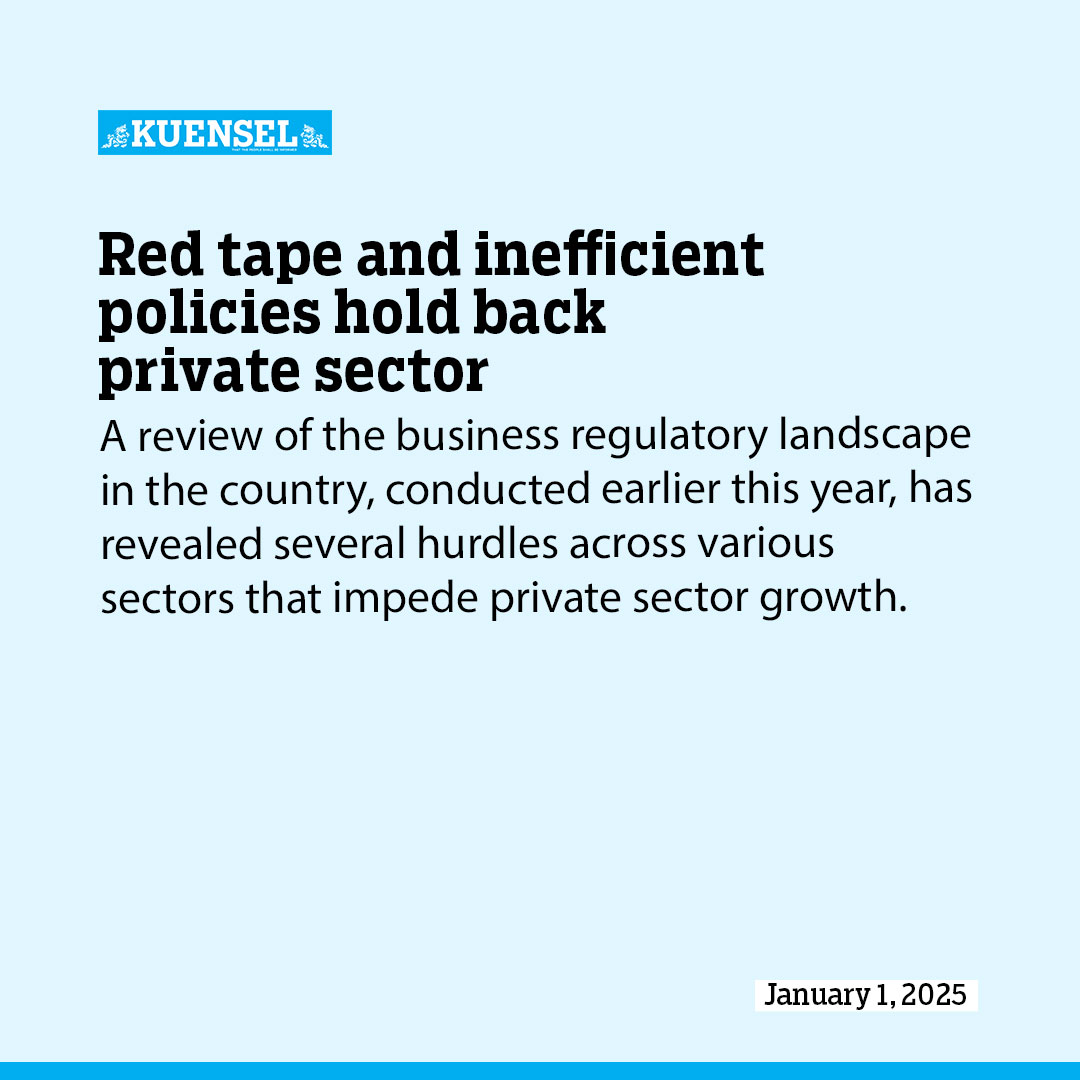Review of business regulations revealed majors hurdles in business environment
Thinley Namgay
A review of the business regulatory landscape in the country, conducted earlier this year, has revealed several hurdles across various sectors that impede private sector growth.
The review analysed and validated 235 issues within business regulations. Among these, 31 issues were tied to licensing and permit regulations, 37 related to tax policies and financial charges, and 27 pertained to the service delivery standards by regulators. In addition, 16 were linked to quality management systems, and 13 focused on access to finance, among others.
The Ministry of Industry, Commerce, and Employment (MoICE), in collaboration with the Voice for Green Change Partnership (V4GCP) Project and the Bhutan Chamber of Commerce and Industry (BCCI), spearheaded the review.
Around 79 percent of the issues were raised by the private sector.
Challenges across key policies
During consultations with the private sector, three domains were identified: general economic development policies, business regulatory processes, and policy processes related to private sector development.
Under general economic development policies, the reviewed policies included the Economic Development Policy 2016, the Fiscal Incentives Act of Bhutan 2021, the Foreign Direct Investment (FDI) Policy 2019, the Public Private Partnership (PPP) Policy 2016, the Cottage and Small Industry Policy 2019, and the National Competition Policy 2020 and the Privatisation of State-Owned Enterprises (SOEs).
Under the Economic Development Policy 2016, businesses faced constraints related to market access, inadequate infrastructure, bureaucratic inefficiencies, and skill shortages.
Similarly, the Fiscal Incentives Act of Bhutan 2021 suffers from administrative inefficiencies and challenges in promoting transparency and coordination.
The primary hurdles in the FDI Policy 2019 are a complex approval process, equity restrictions, minimum investment sizes, travel barriers, and limited country branding.
The review stated that these obstacles hinder FDI growth and require policy reforms for a more conducive investment climate.
In the PPP Policy 2016, delays in approval processes, limited financing options, a small market, and difficulties in attracting investors were identified as major roadblocks.
The issues revealed under the Cottage and Small Industry Policy 2019 are limited access to finance, outdated technology, supply chain inefficiencies, competition from imports, market uncertainties, and insufficient export support.
The review also raised concerns about the unfair advantages SOEs enjoy under the National Competition Policy 2020, which limits market access for the private sector.
Regulatory bottlenecks across multiple sectors
A detailed examination of business regulatory processes further revealed a range of challenges.
Licensing and permit regulations were flagged for being inconsistent and inefficient, with excessive fees that deter business operations, especially for foreign investors.
Similarly, manpower and labour regulations were found to be overly complex, with stringent approval processes for hiring foreign workers, exacerbating skill shortages.
Tax-related issues also emerged as significant concerns, including unclear tax incentives, prolonged assessment procedures, and rigid foreign exchange regulations.
In the procurement sector, a lack of transparency and the imposition of unrealistic timelines were identified as barriers to business growth.
Other critical challenges highlighted included the difficulty in accessing finance due to stringent collateral requirements and the discontinuation of loan schemes aimed at supporting small and medium-sized enterprises.
Market access issues, both domestic and international, also hindered growth, including non-tariff barriers and trade restrictions.
Access to land leases and public infrastructure remains problematic, with negative consequences for agricultural activities and business services like cable operations.
In addition, weaknesses in quality management systems, including insufficient oversight by regulatory bodies and limited testing facilities, continue to pose challenges to businesses.
Recommendations
The review report called for more inclusive policymaking processes, with an emphasis on regulatory impact assessments and greater collaboration between the government and the private sector.
Recommendations from the review include prioritising public consultations, conducting comprehensive impact analyses, and improving access to finance.
The report also stressed the importance of expanding market opportunities, ensuring consistent enforcement of regulations, and streamlining bureaucratic processes.
The report recommended strengthening of skill development initiatives and addressing trade barriers to improve the business environment.


